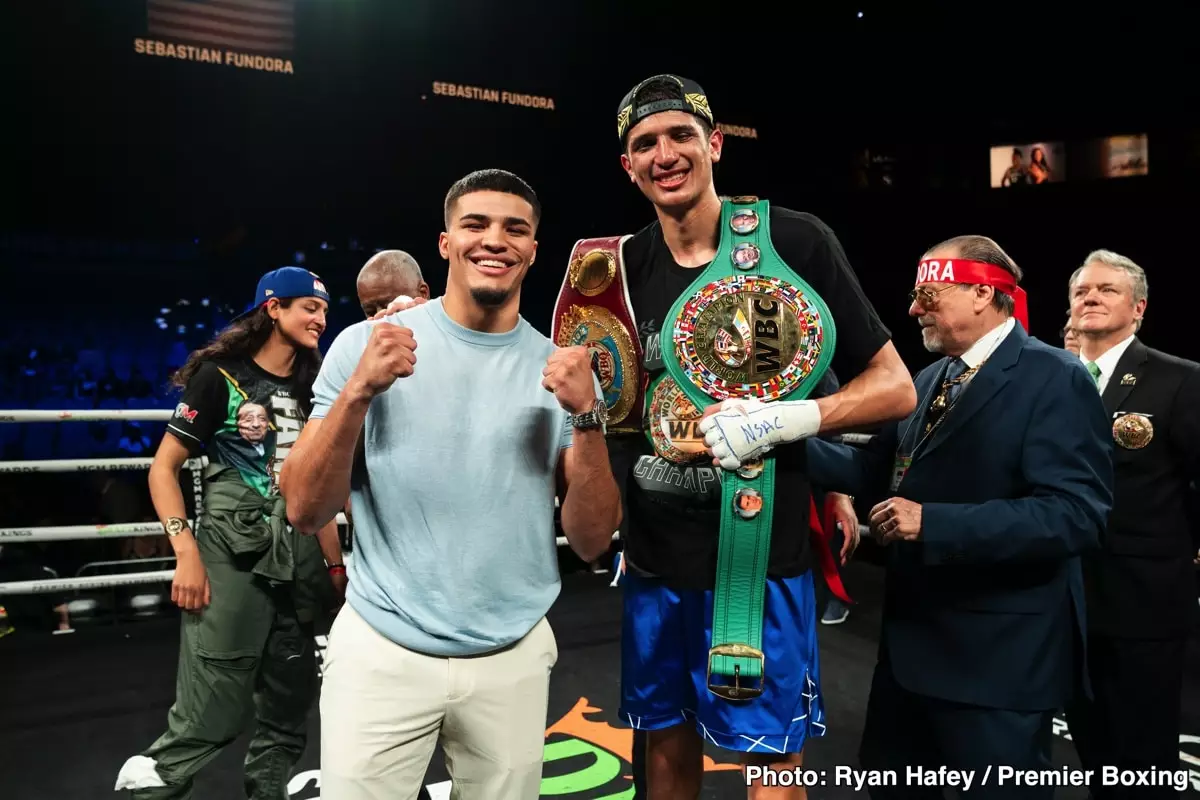In the realm of professional boxing, ambition can often overshadow strategy, as evidenced by the recent encounter between Xander Zayas and the WBC/WBO junior middleweight champion, Sebastian Fundora. After claiming a victory over Chordale Booker through a technical knockout, Fundora found himself unexpectedly confronted by Zayas in his dressing room. The moment, presumably intended as a bold statement of intent, illustrates the complexities involved in the boxing world—where ambition must be tempered by the realities of match-making dynamics and financial considerations.
Zayas, a promising 22-year-old from Puerto Rico, sought to capitalize on his position as the WBO’s mandatory challenger. However, his eagerness to initiate discussions for a title fight with Fundora was met with a cool reception. The move, while aggressive, perhaps lacked the foresight that one would assume comes with training in a sport defined by tactical thinking. In trying to get a jump on promotional efforts, Zayas may have prematurely put his cards on the table without understanding the full landscape of the situation at hand.
The Financial Aspect of Title Fights
At the core of the boxing ecosystem lies the unavoidable reality of financial viability. Promotion executives, particularly in a sport where purses are often multi-million dollar affairs, are invariably motivated by the potential for profit. As echoed by Fundora’s promoter, Sampson Lewkowicz, Zayas is currently not positioned as a high-value opponent for a title defense. With a fanbase largely consisting of hardcore boxing aficionados and the Puerto Rican community, Zayas has yet to break into mainstream recognition.
Fundora, fresh off a significant victory, is likely eyeing more lucrative matchups that would justify the investment in training, preparation, and promotion. This reality starkly contrasts Zayas’s intentions, revealing a mismatch not only in ambition but also in perceived marketability. It isn’t merely about being ready to fight; it’s also about the revenue generated from that fight, which can often seal or sever a potential matchup in this high-stakes game.
The WBO’s Mandate and the Path Forward
Complicating matters further is the stipulation set by the World Boxing Organization (WBO). The governing body has projected that Fundora is expected to defend his title against Zayas within 120 days following his fight with Booker. While this directive could ostensibly appear as a boon for Zayas, it’s a double-edged sword. If Fundora opts to sidestep this matchup, he risks being stripped of his championship title—an uncertain consequence that could open other doors or create a further dilemma for all involved. Yet, should he hold out for unification bouts against champions like Terence Crawford or Bakhram Murtazaliev, the dilemma becomes more acute.
The mandate from the WBO places Zayas officially within the picture, but it doesn’t guarantee him a favorable position. Notably, the governing body’s decision to sanction Zayas’ previous fight against Slawa Spomer as a title eliminator raises eyebrows about the fairness and competitiveness of the selection process, especially since Spomer had not faced any ranked contender prior to their encounter. Many would argue that Zayas deserved a tougher challenge to validate his claim to the mandatory position.
The Road Ahead for Zayas
Despite the roadblocks presented by Fundora’s hesitance and market dynamics, Zayas should take this setback as an opportunity for growth and resilience. Getting involved in negotiations as an eager challenger is commendable, but Zayas must also be strategic. By prioritizing exposure and increasing his fanbase, he could make himself a more enticing opponent—not just for Fundora but for the entire junior middleweight landscape.
If Zayas remains steadfast in his training and continues to perform well against stronger opponents, he may eventually emerge as a household name in the sport. This potential trajectory can solidify his status beyond just being a mandatory challenger. How Zayas navigates the current landscape in both his ambition and approach to further challenges will ultimately define his legacy in the sport. To reconcile the differences between his aspirations and the financial realities of boxing, Zayas must evolve from merely wanting a title fight to positioning himself as a fighter that champions cannot afford to overlook.

